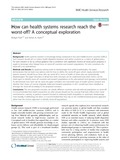| dc.contributor.author | Pratt, Bridget | |
| dc.contributor.author | Hyder, Adnan A. | |
| dc.date.accessioned | 2017-04-06T14:59:29Z | |
| dc.date.available | 2017-04-06T14:59:29Z | |
| dc.date.issued | 2016-11-15 | |
| dc.identifier.citation | Pratt, B. and Hyder, A.A. (2016) How can health systems research reach the worst-off? A conceptual exploration. BMC Health Services Research, 16(7), p.143. | en |
| dc.identifier.issn | 1472-6963 | |
| dc.identifier.uri | https://opendocs.ids.ac.uk/opendocs/handle/20.500.12413/12939 | |
| dc.description.abstract | Background:
Health systems research is increasingly being conducted in low and middle-income countries (LMICs). Such research should aim to reduce health disparities between and within countries as a matter of global justice. For such research to do so, ethical guidance that is consistent with egalitarian theories of social justice proposes it ought to (amongst other things) focus on worst-off countries and research populations. Yet who constitutes the worst-off is not well-defined.
Methods and Results:
By applying existing work on disadvantage from political philosophy, the paper demonstrates that (at least) two options exist for how to define the worst-off upon whom equity-oriented health systems research should focus: those who are worst-off in terms of health or those who are systematically disadvantaged. The paper describes in detail how both concepts can be understood and what metrics can be relied upon to identify worst-off countries and research populations at the sub-national level (groups, communities). To demonstrate how each can be used, the paper considers two real-world cases of health systems research and whether their choice of country (Uganda, India) and research population in 2011 would have been classified as amongst the worst-off according to the proposed concepts.
Conclusions:
The two proposed concepts can classify different countries and sub-national populations as worst-off. It is recommended that health researchers (or other actors) should use the concept that best reflects their moral commitments—namely, to perform research focused on reducing health inequalities or systematic disadvantage more broadly. If addressing the latter, it is recommended that they rely on the multidimensional poverty approach rather than the income approach to identify worst-off populations. | en |
| dc.language.iso | en | en |
| dc.publisher | BMC Health Services Research | en |
| dc.rights.uri | http://creativecommons.org/licenses/by/4.0/ | en |
| dc.subject | Health | en |
| dc.title | How Can Health Systems Research Reach the Worst-Off? A Conceptual Exploration | en |
| dc.type | Article | en |
| dc.identifier.externaluri | https://bmchealthservres.biomedcentral.com/articles/10.1186/s12913-016-1868-6 | en |
| dc.identifier.doi | 10.1186/s12913-016-1868-6 | |
| dcterms.dateAccepted | 2016-11-15 | |
| rioxxterms.funder | Default funder | en |
| rioxxterms.identifier.project | Default project | en |
| rioxxterms.version | VoR | en |
| rioxxterms.versionofrecord | 10.1186/s12913-016-1868-6 | en |
| rioxxterms.funder.project | c941507f-fd0b-4fc3-9822-4b2132f61a1d | en |


